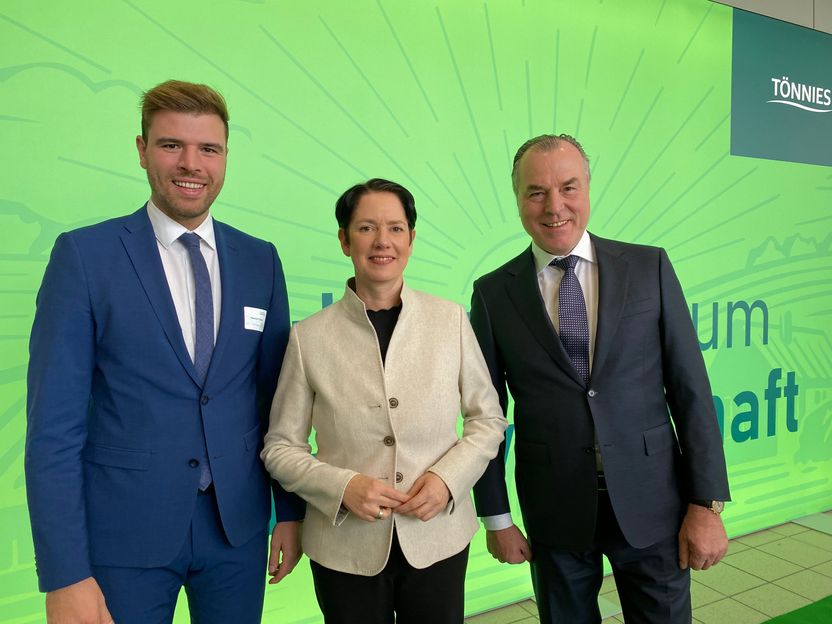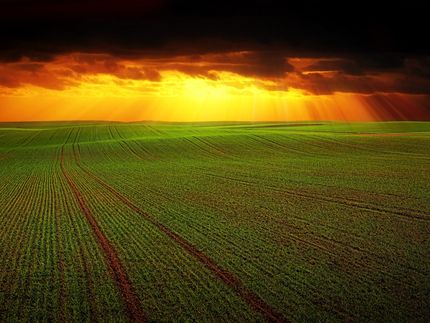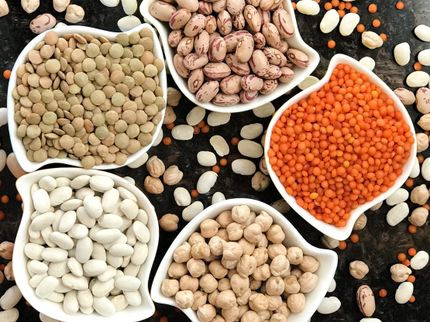Tönnies Group launches first nationwide "Meat Climate Platform"
100 guests at the Future Forum for Agriculture
Advertisement
In the presence of around 1,000 agricultural partners and high-ranking guests from federal, state and local politics, the Tönnies Group launched the first "Meat Climate Platform" on Wednesday. With this platform, the food producer from Rheda-Wiedenbrück aims to strengthen regional production on family farms and at the same time make the climate performance of local producers transparent. The presentation of the new tool was embedded in the "Future Forum Agriculture" at the A2 Forum in Rheda-Wiedenbrück.

Tönnies Group launches first nationwide "Meat Climate Platform"
Tönnies Gruppe
One week before the start of the 28th UN World Climate Change Conference in Dubai, the launch of the Tönnies Group's climate platform aims to make the climate protection achievements of domestic agriculture transparent. While an interim assessment of the implementation of the 2015 Paris Climate Agreement is being made in the Persian Gulf under the auspices of the United Nations, German farmers can look back proudly on their climate protection achievements. "Since 1990, German agriculture has reduced greenhouse gas emissions by more than 20 percent while at the same time increasing production volumes," emphasized Dr. Wilhelm Jaeger, Head of the Agriculture Department at Tönnies, at the "Future Forum Agriculture". However, this should only be a milestone. "The agricultural and meat industries want to work together to drive climate protection even further forward," he emphasized. German food production is closely linked to sustainable livestock farming, said Jaeger. "Knowledge of the climate impact along the entire value chain and identifying the potential for improvement are fundamental to this."
This is precisely where the climate platform comes in: Farmers can now register on the online platform (www.klimaplattform-fleisch.de) and enter their farm data such as size, feed components, electricity consumption and more. "All of our producers who use the platform will receive a customized overview of the results promptly after entering the data and can compare the values with other farms," adds Franziska Elmerhaus, Project Manager in the Agriculture department at Tönnies. "Based on the results and comparison options, adjustments can be identified to reduce the company's carbon footprint even further." The ball is now rolling. With the climate platform, Tönnies is aiming for a standardized industry solution and wants to involve all market participants.
"Adequate prices for producers and affordable prices for consumers"
"We work with around 11,000 agricultural businesses. The aim of us, the trade and politicians must be to strengthen the domestic supply of good and safe food," explained Clemens Tönnies, Managing Partner of the Tönnies Group, at the Future Forum. "It is anything but sustainable to cover demand by importing from countries that are significantly below our standards, especially when it comes to animal husbandry," emphasized Maximilian Tönnies. "We compensate for the efficiency disadvantage that German farmers often have compared to the global competition through our efficiency in processing and the complete utilization of all parts of an animal. In this way, we achieve a fair price for the producer and at the same time affordable prices for consumers - with regionally produced products," he said. "Ultimately, we need adequate prices for producers and affordable prices for consumers at the same time," continued Clemens Tönnies.
The future forum of the Rheda-Wiedenbrück-based family business was all about strengthening local agriculture. "Day after day, farmers and the many upstream and downstream companies in the agricultural and food sector in our state ensure that the shelves in the supermarkets are filled with fresh and high-quality food from our regions," said NRW Minister of Agriculture Silke Gorißen, addressing the participants at the Future Forum. "We will continue to need this strong and regionally anchored agriculture and food industry for North Rhine-Westphalia in the future. Our aim is therefore to strengthen regional value chains," she promised the farmers. However, this also requires a clear commitment from the federal government to sustainable livestock farming.
"Meat is much better than its reputation and remains important for human nutrition"
In his presentation, Dr. Hinrich Snell, Head of the Department for the Restructuring of Livestock Farming at the Federal Ministry of Food and Agriculture (BMEL), described the restructuring of livestock farming as "one of the BMEL's central projects in this legislative period". This would require various independent components. "In addition to animal husbandry labeling, this includes changes to building law, the removal of obstacles in immission control and the establishment of a federal program for barn conversion in order to promote the investment costs for more animal-friendly barns and the running costs for better husbandry," said the top Berlin official.
Prof. Dr. Peer Ederer put one of the core problems of German agriculture and meat production in a nutshell: "Not everything that is often said is true," said the Director of GOALSciences. The observatory for livestock farming deals scientifically with the entire range of topics. His conclusion: "Meat is much better than its reputation and remains important for human nutrition," emphasized Prof. Dr. Ederer. He appealed to farmers to go out themselves and seek dialog. "To do this, we need to sharpen our own arguments and seriously and credibly drive forward the necessary innovations." The newly created climate platform is an important instrument for this, he said.
Note: This article has been translated using a computer system without human intervention. LUMITOS offers these automatic translations to present a wider range of current news. Since this article has been translated with automatic translation, it is possible that it contains errors in vocabulary, syntax or grammar. The original article in German can be found here.
































































